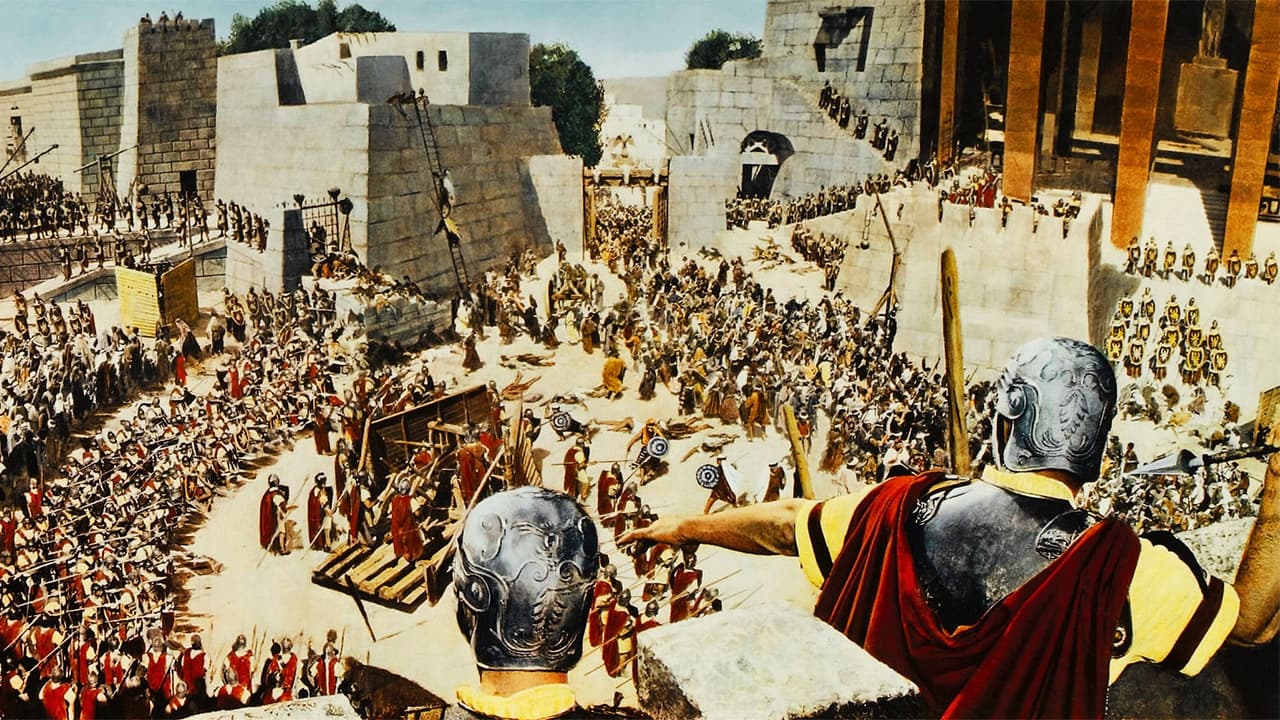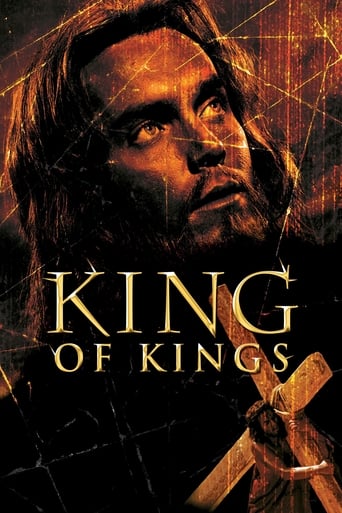James Hitchcock
"King of Kings" was one of two American Biblical epics about the life of Jesus Christ made in the early sixties, the other being "The Greatest Story Ever Told". Apart from the opening scene, which deals with the conquest of Jerusalem by Pompey the Great, most of the material is taken from the New Testament, but certain elements are emphasised more than others and the order of events is changed. For example, the Sermon on the Mount, which in the Gospels occurs very early on in Jesus's ministry, is here moved to a much more central position in the film.Great stress is placed upon matters such as the Massacre of the Innocents or the Herod/John the Baptist/Salome story, with other matters, such as most of Jesus's miracles, either omitted altogether or mentioned only in passing without being shown. Pontius Pilate is introduced as a major character long before the arrest and trial of Jesus. The main difference from the Gospel narrative is the greater importance given to Barabbas, mentioned only briefly in the Bible but here made the leader of the Zealots, the Jewish movement which fought for the freedom of their country from Roman rule. He even leads a revolt against the Romans during Holy Week, something not in the Bible. Judas Iscariot is also here portrayed as a Zealot and as a friend of both Barabbas and Jesus.These changes, however, were not simply made on a whim but with a definite purpose in mind, that of placing Jesus's life in the political context of the Roman occupation and the tyranny of Rome's client rulers, Herod the Great and his son Herod Antipas. The villains of the film are not so much Barabbas and Judas but Pilate and the two Herods. Judas becomes a follower of Jesus because he sees Him as the long-awaited Messiah- the mighty military and political leader destined to restore the Kingdom of Israel. It is only when he hears the Sermon on the Mount that he realises that Jesus's message is one of peace rather than war. His betrayal of Jesus is not motivated by financial greed, as in the Gospels, but by the belief that the prospect of impending crucifixion will force Jesus's hand and compel Him to call upon Divine aid to expel the Romans.Many Biblical or quasi-Biblical epics such as "Ben-Hur" were enormously popular in their day, but "King of Kings" was something of an exception. The critical response when it was first released in 1961 was lukewarm, and it acquired the mocking nickname "I Was a Teenage Jesus", a play on titles like "I Was a Teenage Werewolf", because of Jeffrey Hunter's youthful, matinée idol looks. (In fact, Hunter was 33 at the time, the same age as Jesus at His death). During my youth in the seventies and eighties it was fashionable to sneer at the epic genre; "Spartacus" was perhaps an exception, because of the esteem in which Kubrick was held, but films like "King of Kings" were seen as vulgar spectacles, overly reverential towards their subject-matter, all show and little substance. It was films like this which the Pythons were sending up in "Life of Brian".How things change. Just as the once unfashionable art and architecture of the Victorian period has come back into fashion, so recent decades have seen a rebirth of appreciation for the once derided epic. Not only "Spartacus" but also the likes of "Ben-Hur" and "The Ten Commandments" are now widely regarded as masterpieces. "King of Kings" is another film to have benefited from this revaluation, perhaps aided by a rediscovery of its director Nicholas Ray as an auteur.Even many non-Christians will recognise Jesus's importance as a historical figure, and this film, rather than relying upon unthinking reverence, takes the intelligent stance of looking at His life in its historical context. Hunter, for all the mockery once directed at him, actually acquits himself well in one of the most difficult roles any actor can be asked to play. His Jesus is (as any stage or screen Jesus must be) someone radically different from the common mass of humanity. He offers a radical challenge not only to the Herods and Pilates of this world, with their doctrine that might is right, but also to the Barabbases and Judases, whose only answer to violence is to meet it with more violence. Ray pays much attention to Hunter's piercing blue eyes, which become a symbol of Jesus's spiritual authority.Other good performances come from Robert Ryan as John the Baptist, Frank Thring as Antipas and Brigid Bazlen as Salome. Bazlen, only 17 years old, was much criticised at the time for her interpretation, which may partly have been why her film career was to be a short one, but she seemed to me to bring to the role the right balance of seductiveness and heartlessness.Other targets for criticism at one time might have been Miklós Rózsa's musical score and Orson Welles's voice-over narration, and although they might be a bit over-portentous for modern tastes we have to accept them as part of the epic style. And Ray certainly shows that he can handle that style well, both in the grand scenes such as the Sermon on the Mount, with its thousands of extras, or the battles between Romans and Zealots, and also in more intimate scenes like the Last Supper. Every shot seems to be composed to achieve the maximum effect. Ray's greatest achievement, however, is to offer us fresh insights into what might otherwise have been The Most Over-Familiar Story Ever Told. 8/10 Some goofs. Pontius Pilate's wife Claudia is described as the daughter of the Roman Emperor Tiberius, but in reality Tiberius had sons but no daughters. Also, he would not have been described as "the divine Tiberius" during his lifetime.
mike48128
Jeffrey Hunter, at age 35, does the most haunting portrayal of Jesus ever filmed. Some will argue that Max Von Sydow does it better in "The Greatest Story Ever Told" but I have recently watched both films. This Jesus has dirty brown (almost blonde) hair and piercing blue eyes. He portrays Jesus in a joyous manner until his Crucifixion becomes most eminent. Also, this film is so much better, having been directed by Nicholas Ray and not by George Stevens. It plays like a "Cecile B. DeMille" production. The scenes are more memorable here. Especially effective is the "Sermon on the Mount", which reportedly had 7,000 extras. Sure, parts of it are very melodramatic: Salome's dance of the 7 veils. Herod's impending madness. Pontius Pilate's prosecution of Jesus in such a "forgiving" manner. The unnecessary spectacle of the Roman battles. But all this makes for a very watchable film that does not bore, in spite of its 168 minute length. Orson Welles' narration even adds an air of "authority" to the proceedings, as does the dramatic musical score. Rip Torn as "Judas" gives an Oscar-worthy performance. There are weaknesses as well, as not even a movie about the Christ is perfect: Most of the "extras", and even Mary, look Italian because they are. Various accents occasionally mar the dramatic performances. However, it avoids a glut of possible "special effects" that could have been used to portray the miracles but would have "cheapened" the end result. Most miracles are described but not shown. (Unlike "The Ten Commandments") Although not accurate to "The New Testament", you will watch this version many times; and that alone makes it superior to "The Greatest Story Ever Told", which was beautiful to see, but almost put me to sleep several times! Too graphic for small children. PG-13 is my rating.
PastorDIC
Someone should have read the New Testament before writing this movie. Halfway through, my wife and I found at least ten things that were falsehoods/inaccuracies according to the Bible. They made up a lot of stuff. We didn't plan on looking for inaccuracies, they just kept showing up and then we started noticing them. After starting to see the very beginning we expected something like a movie like one directed by John Ford. We didn't get it, even though we got narration by Orson Wells. There are much better movies about the life of Christ than this one. At least they got the crucification, burial, and resurrection of Jesus Christ right except for some fillers. Praise Jesus Christ for our salvation.

